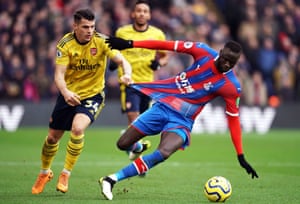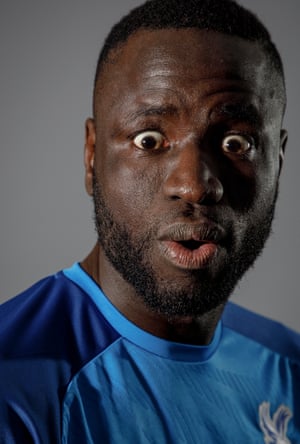[ad_1]
‘We don’t like that,” says Cheikhou Kouyaté, frowning. “But what can we do? They never listen to us players.” Having just completed a session at Crystal Palace’s training ground in Beckenham on a chilly January day, Senegal’s captain has a towel slung over his broad shoulders to keep out the cold.
Less than 24 hours after the decision was taken to switch the 2021 edition of the Africa Cup of Nations in Cameroon from summer to the middle of next season, he wants to get something off his chest.
“Imagine if you are playing for a club in Europe and then suddenly you have to leave during the middle of the season and let your team down? It’s so hard for me and my African brothers,” he says. “Nobody wants to miss any part of the season, especially at such an important time of the year. It puts us all in a very difficult position. Imagine what it’s going to be like this time next year – Liverpool will be without three of their best players in Sadio [Mané], [Mohamed] Salah and Naby Keïta; here we have me, Jordan Ayew, Wilfried Zaha and Jeffrey Schlupp …”
Jürgen Klopp’s suggestion that the switch to January could put European clubs off signing African players struck a chord with Kouyaté, who was in the Senegal side also featuring Mané that lost to Algeria in the final of last year’s tournament in Egypt. “You could understand if that happened,” he says, nodding. “Managers need to have a strong squad that they can rely on all of the time.”
Kouyaté should know. It is almost six years since he moved to the Premier League, having first tried his luck in Europe aged 17. Without a work permit and threatened with deportation from France, the midfielder was adopted by his Belgium-based agent before eventually being recruited by Anderlecht. But it was his performances for Senegal at the 2012 Olympics in London that proved to be the launchpad for him and many of his international teammates.
“After the Olympics, so many players got contracts with big European clubs – it opened the doors for so many of our generation,” he says. “We’ve come a long way … we’re from small towns with nothing there, no prospects. If you want to make it you need to fight as hard as possible.
“There are so many great players in Senegal but you need to have some luck to make it. For me, Sadio and Idrissa [Gueye], we knew we had to take this chance.”
Kouyaté won four league titles with Anderlecht and was heavily linked with Arsenal before joining West Ham in 2014. He initially found the change of scenery hard to deal with.
“In my first year here, every week I would want to go back to Belgium,” he says. “My friends were asking me why I kept coming back and I would tell them: ‘It’s because I don’t like London.’ But after three or four months I got to know some of the players at West Ham like Carlton Cole, Diafra Sakho and Mark Noble – he helped me a lot.”

West Ham finished seventh in Kouyaté’s second season and he scored the first goal at the club’s new London Stadium home in a Europa League tie in August 2016. But his spell in east London soured in February 2018 when Tony Henry, the club’s head of player recruitment, was suspended following allegations that he wanted to limit the number of African players in their squad because some “have a bad attitude” and “cause mayhem” when they are not in the team.
On the day the story broke, Kouyaté posted a selfie on Instagram with the caption: “African and proud” and now acknowledges the message was in direct response to what West Ham later condemned as “unacceptable comments” by an employee they sacked.
“It was because we are so proud of where we are from,” he says. “We love football and we love having the chance to play in Europe. We don’t see any difference between white and black people. But sometimes we have some crazy people who I don’t understand why they say things … This is very hard for some brothers. For me, we just need to forget that and focus on our job.
“This is life – sometimes you can do nothing. We talk, we talk, we talk [about racism] but tomorrow you’re going to see another thing. Take your time to concentrate on those that are close to you like your family and try to give love to them. Forget the rest and you will be happy.”
Palace’s longstanding interest in Kouyaté culminated in a £9.5m move in August 2018, allowing him to link up again with his former West Ham teammate James Tomkins. Despite the large African contingent in Roy Hodgson’s squad, Kouyaté insists that was not a factor in his decision.

“I knew there were a lot of African players here but the white people are like Africans also. You have [James] McArthur, Luka [Milivojevic, also a former teammate at Anderlecht], James Tomkins … These are people that I knew before I came and they have made things easier for me. The team spirit here is unbelievable and it really helped with my integration. After nine months it felt like I had been here for five years.”
As well as football, there is another passion that runs through the squad. “We usually go to each other’s houses for food,” Kouyaté says. “We play a game in training and if you lose, then we have to come to your home for food. Sometimes we go to Mama [Sakho]’s house, mine or [Christian] Benteke’s. My wife is a very good cook – we usually have Yassa chicken, which is a typical food from Senegal that has lots of onions, mustard and peppers served with rice and pasta. It is really nice … you will have to try it one time. But it’s different every time. For example when we go to Jordan’s house we have Ghanaian food.”
Senegal’s defeat in the Africa Cup of Nations final on 12 July – a “very bad moment”– meant Kouyaté had two weeks off before the new season. But his outstanding form has played a large part in Palace’s position four points off fifth place with just over a third of the campaign remaining. Kouyaté scored his first goal for the club in the win over West Ham on Boxing Day, although that was somewhat overshadowed by Ayew’s wonder-strike that was reminiscent of his father – the former Marseille and Ghana forward Abedi Pelé.
“His father is the best one,” Kouyaté says. “Of all that generation … everyone knows him and everyone loves him. He is a legend. But it’s not easy if you have a famous dad – you have to be a good player otherwise it’s: ‘Pah, you are not as good as your father.’ The goal against West Ham, it was even better than his dad. Like Maradona.”
As for whether Palace can improve on last season’s 12th place or surpass 2015’s Premier League high of 10th, Kouyaté is taking nothing for granted. “We have one objective: to finish higher than we did last year … But the first priority has to be make sure we are safe from relegation.”
He also has big plans to try to emulate two of Senegal’s successful youth academies by opening his own once his career is over. Generation Foot and Diambars – established thanks to support from Dakar-born Patrick Vieira – have helped produce players such as Mané, Gueye and Watford’s Ismaïla Sarr over the past decade and Kouyaté believes it is only the start.
“We need to continue this way because you can see how successful they have been. For me, it is a dream to do something like this in the future. We want to help as many people as possible to have a chance.”
[ad_2]
Source link
